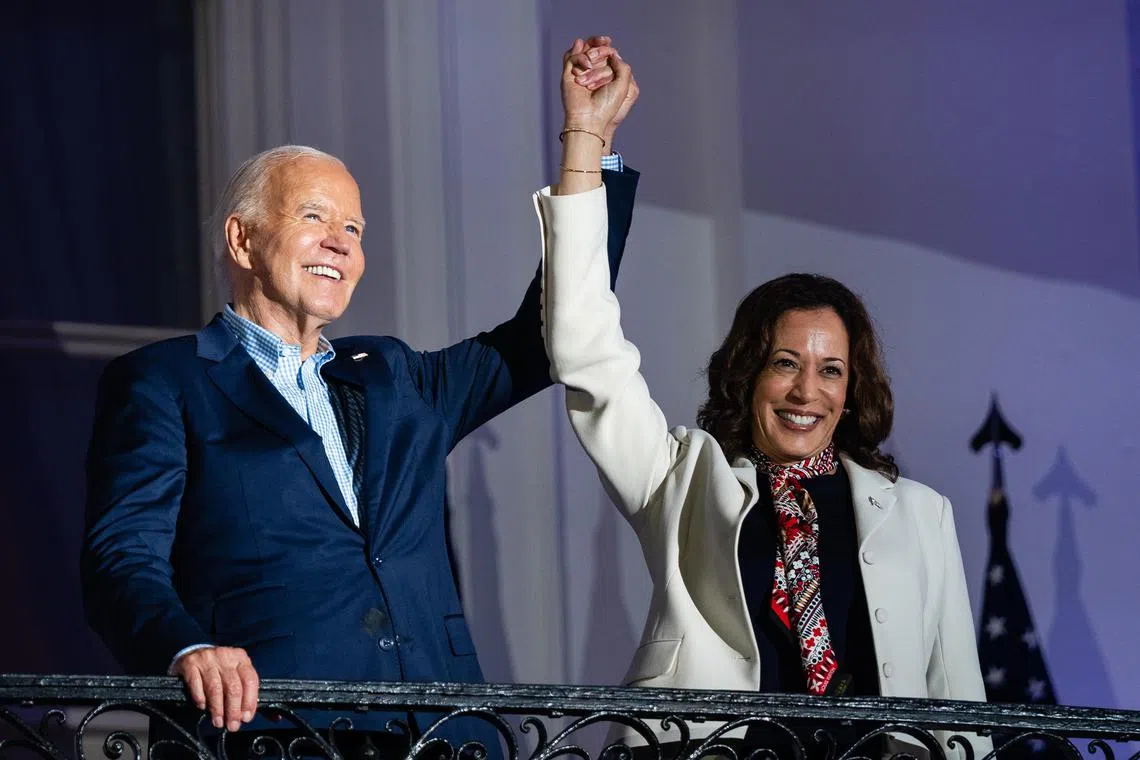Biden’s pullout changes the equation for nervous markets
Sign up now: Get ST's newsletters delivered to your inbox

All eyes are now on the Democratic National Convention in August, where markets hope US Vice-President Kamala Harris will be confirmed as the Democratic presidential candidate.
PHOTO: NYTIMES
SINGAPORE - Global financial markets are grappling with the ramifications of US President Joe Biden’s overnight decision to withdraw from the 2024 presidential race and endorse Vice-President Kamala Harris.
Asian stock markets, the first to react, dropped on July 22 as investors nervously assessed the US news and the impact of the massive global tech outage on July 19.
In Singapore, the Straits Times Index closed down 0.3 per cent. Japan’s Nikkei index fell 1.16 per cent, while Australia’s S&P/ASX 200 retreated 0.5 per cent and South Korea’s Kospi lost 1.14 per cent.
The Shanghai Composite Index slipped 0.61 per cent, as surprise rate cuts by China’s central bank
But Hong Kong’s Hang Seng Index rallied 1.25 cent, as shares of Chinese data security companies surged on hopes the global tech crash from a faulty software update by US-based CrowdStrike might boost demand for domestic alternatives.
US stock futures inched up, indicating markets there were giving a cautious thumbs up to Mr Biden stepping down and the prospect of a Harris candidature.
While former president Donald Trump had been solidly ahead of Mr Biden in opinion polls, the equation has changed now that Ms Harris is likely to be the Democratic candidate.
Opinion polls place her within 3 percentage points of Trump, but opinion polls can swing.
“If Kamala Harris is officially nominated at the Democratic National Convention (DNC) between Aug 19 and 22, it could now make it much harder for Trump to win,” said Mr Vasu Menon, managing director for investment strategy at OCBC Bank. “He’s ahead of Harris for now in opinion polls, but the margin is not significant and things could change.”
But what will the changed dynamics mean for markets?
President Biden and Trump have different views on how to manage the economy. While Mr Biden favours higher taxes and a more active government role in industry, Trump wants less immigration, lower taxes and higher tariffs. These could be inflationary.
A Trump win is widely seen as prompting changes to fiscal, immigration, trade and foreign policies. Besides being inflationary, analysts reckon it also will lead to more global policy uncertainty.
A Kamala Harris entry into the race would change the equation.
If Ms Harris leads the Democrats, much of President Biden’s economic policies may be kept intact and there would be policy continuity.
More importantly, the US Federal Reserve can act independently without political interference, and cut rates unhindered if it so decides. There will be less policy uncertainty overall.
In short, a Harris presidency could be good for markets.
The US dollar weakened slightly, likely because a Trump victory looks less assured now, and that means a clearer path for the Fed to cut rates every quarter in 2025. Lower rates are likely to weigh on the dollar.
All eyes are now on the DNC in August, where markets hope Ms Harris will be confirmed as the Democratic presidential candidate. Ms Harris will have access to all of the Biden-Harris election funds, and big donors are reportedly stepping back in to support the Democratic campaign.
But Ms Harris’ nomination as candidate is no sure thing at the moment, and there are some nervousness and uncertainty about whether she can secure enough delegates to get the official nomination.
In any case, the US electoral register shows 49 per cent of voters are Democrats and 48 per cent are Republicans. Ultimately, a lot now hinges on Ms Harris getting the nomination, how she performs and voter turnout on election day.
In the US, voting is not compulsory and so voter turnout can make a big difference.
There are about three more months before the US elections. And three months can be a long time in politics.
At the moment, Trump has a slight 2 per cent to 3 per cent edge over Ms Harris, but investors need to be ready for surprises, said market watchers. This is the constant seen so far in 2024. Nothing should be taken for granted.
“Markets are going to be terribly volatile until the Democrat nominee is known,” Mr Jamie Cox, managing partner of Harris Financial Group, told USA Today. “That is likely to manifest itself through the dollar, creating volatility in fixed income and equities.”
OCBC’s Mr Menon said having a resilient portfolio is the right strategy for investors at the moment. While looking to maximise returns, also look at minimising risks.
“Concentrated positions should be avoided, particularly in technology. Equities exposure should be positioned for a broadening of the market performance to non-technology sectors,” said Mr Menon. “Gold offers a hedge against volatility.”



